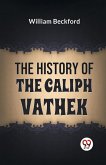The novel chronicles the fall from power of the Caliph Vathek (a fictionalized version of the historical Al-Wathiq), who renounces Islam and engages with his mother, Carathis, in a series of licentious and deplorable activities designed to gain him supernatural powers. At the end of the novel, instead of attaining these powers, Vathek descends into a hell ruled by the demon Eblis where he is doomed to wander endlessly and speechlessly.
Hinweis: Dieser Artikel kann nur an eine deutsche Lieferadresse ausgeliefert werden.
Hinweis: Dieser Artikel kann nur an eine deutsche Lieferadresse ausgeliefert werden.








